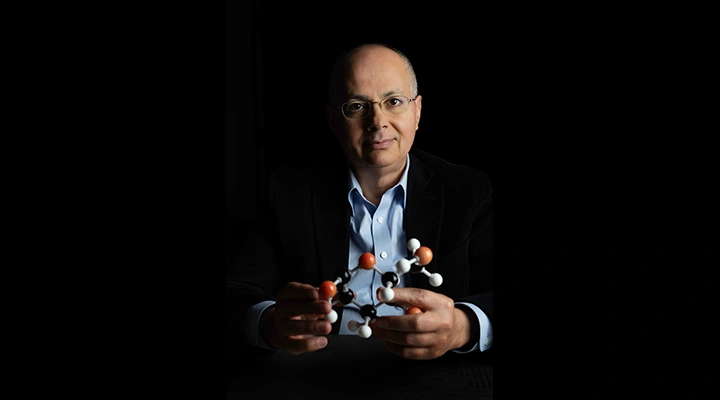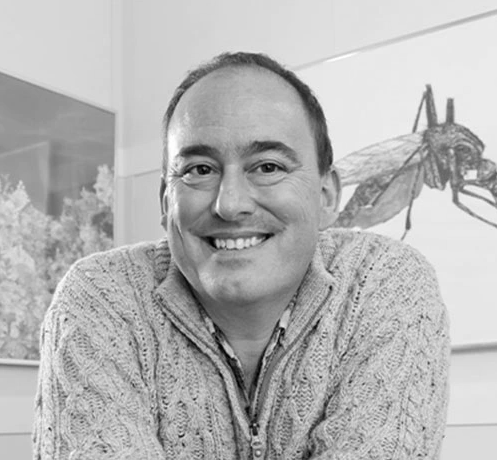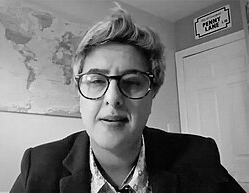Meet Omar Yaghi, the Nobel Prize chemist turning air into water

Professor Tim Coulson
- Published
- Opinion & Analysis

From a childhood in a one-room home in Amman to chemistry’s highest honour, Omar Yaghi’s creation of metal–organic frameworks is reshaping how we draw water from the air and carbon from the atmosphere. The European’s Professor Tim Coulson and Professor Syma Khalid, both of the University of Oxford, spoke with him on their Science of the Times podcast
Omar Yaghi’s parents were Palestinian refugees. He grew up in Amman, Jordan, in a single-roomed crowded house shared, at times, with the family’s cows. One school lunchtime, he snuck into the library and found a chemistry book with stick and ball diagrams of molecules. He was fascinated, and so begun his remarkable career as a chemist, and now Nobel Prize winner. Along with Susumu Kitagawa and Richard Robson, Professor Yaghi has been awarded the 2025 Nobel Prize for Chemistry. Congratulations to them all.
These three chemists developed something known as meta-organic frameworks, or MOFs, a type of ‘chemical Lego’, which many chemists were sceptical could exist when Yaghi started working on them. Most chemists believed large, regular, solid structures could not be built up by joining connecting molecules.
MOFs are made by joining metal atoms, like zinc, copper, or iron, with carbon-based molecules that act like rods or bridges. The result is a crystal with an incredibly porous structure, a bit like a rigid sponge, but one that’s full of tiny, regular holes at the molecular scale. Because of all these pores, MOFs have huge internal surface areas. A single gram of some MOFs can have as much surface area as a football field.
Because of their large surface area, MOFs can be designed to soak up, store, and separate gases and liquids very efficiently, and herein lies their magic. These materials can be designed to catch water or carbon dioxide from the air and coaxed to release it at a later time, often by simply heating up the materials a little. They also have the potential to store hydrogen as a fuel, releasing it as needed to power engines.
Last week, a few days before his Nobel Prize was announced, Omar appeared on Science of the Times podcast. As well as describing his remarkable life and career, he also explained how MOFs have been developed to capture water from air in arid parts of the world. The material then can be heated up, sometimes using sunlight, to release the extremely pure water, which is safe to drink and can be used for irrigation. The process has recently been commercialised, with relatively small machines producing hundreds of litres of water each day. Very recent work on water from Omar’s group is also exploring the removal of ‘forever plastics’ from water.
Work is ongoing to work out how to mass produce MOF materials to capture carbon dioxide from the atmosphere. If successful, this could be game changing technology to help us reverse climate change. Carbon dioxide could be sucked out of air to be later released and stored safely underground.
Omar and his co-winners have developed materials with the potential to change the world. Their Nobel Prize is a fabulous achievement, extremely well deserved, and, you could say, it came almost out of thin air.

Professor Tim Coulson is a biologist at the University of Oxford, where he has led both the Zoology and Biology departments. He was previously professor of Population Biology at Imperial College London and has held positions at Cambridge University and the Institute of Zoology London. A highly decorated scientist with awards from major institutions including the Royal Society, he has edited leading journals and served on Government advisory boards. His first book for general readers, “A Little History of Everything” (Penguin Michael Joseph), traces the 13.8-billion-year story from the Big Bang to human consciousness and is available to buy on Amazon. He is also cohost of the popular science podcast, Science of the Times.

Professor Syma Khalid is Professor of Computational Microbiology in the Department of Biochemistry at the University of Oxford, and a Fellow and Tutor at St Anne’s College. Her research specialising in the use of computer simulations to study the molecular machinery of microbes and its role in health and disease. She is the chair of HECBioSim which allocates resource on national and regional supercomputing facilities for biomolecular simulations. She is also cohost of the popular science podcast, Science of the Times.
READ MORE: ‘Professor Tim Coulson on Life, Chance, and the Science of Existence‘. A Q&A with Professor Tim Coulson following the publication of his latest book, The Universal History of Us: a 13.8-billion-year tale from the Big Bang to You (Penguin Michael Joseph).
Do you have news to share or expertise to contribute? The European welcomes insights from business leaders and sector specialists. Get in touch with our editorial team to find out more.
Main image: Omar Yaghi by Christopher Michel, 2025. Licensed under CC BY-SA 4.0 via Wikimedia Commons.
RECENT ARTICLES
-
 The era of easy markets is ending — here are the risks investors can no longer ignore
The era of easy markets is ending — here are the risks investors can no longer ignore -
 Is testosterone the new performance hack for executives?
Is testosterone the new performance hack for executives? -
 Can we regulate reality? AI, sovereignty and the battle over what counts as real
Can we regulate reality? AI, sovereignty and the battle over what counts as real -
 NATO gears up for conflict as transatlantic strains grow
NATO gears up for conflict as transatlantic strains grow -
 Facial recognition is leaving the US border — and we should be concerned
Facial recognition is leaving the US border — and we should be concerned -
 Wheelchair design is stuck in the past — and disabled people are paying the price
Wheelchair design is stuck in the past — and disabled people are paying the price -
 Why Europe still needs America
Why Europe still needs America -
 Why Europe’s finance apps must start borrowing from each other’s playbooks
Why Europe’s finance apps must start borrowing from each other’s playbooks -
 Why universities must set clear rules for AI use before trust in academia erodes
Why universities must set clear rules for AI use before trust in academia erodes -
 The lucky leader: six lessons on why fortune favours some and fails others
The lucky leader: six lessons on why fortune favours some and fails others -
 Reckon AI has cracked thinking? Think again
Reckon AI has cracked thinking? Think again -
 The new 10 year National Cancer Plan: fewer measures, more heart?
The new 10 year National Cancer Plan: fewer measures, more heart? -
 The Reese Witherspoon effect: how celebrity book clubs are rewriting the rules of publishing
The Reese Witherspoon effect: how celebrity book clubs are rewriting the rules of publishing -
 The legality of tax planning in an age of moral outrage
The legality of tax planning in an age of moral outrage -
 The limits of good intentions in public policy
The limits of good intentions in public policy -
 Are favouritism and fear holding back Germany’s rearmament?
Are favouritism and fear holding back Germany’s rearmament? -
 What bestseller lists really tell us — and why they shouldn’t be the only measure of a book’s worth
What bestseller lists really tell us — and why they shouldn’t be the only measure of a book’s worth -
 Why mere survival is no longer enough for children with brain tumours
Why mere survival is no longer enough for children with brain tumours -
 What Germany’s Energiewende teaches Europe about power, risk and reality
What Germany’s Energiewende teaches Europe about power, risk and reality -
 What the Monroe Doctrine actually said — and why Trump is invoking it now
What the Monroe Doctrine actually said — and why Trump is invoking it now -
 Love with responsibility: rethinking supply chains this Valentine’s Day
Love with responsibility: rethinking supply chains this Valentine’s Day -
 Why the India–EU trade deal matters far beyond diplomacy
Why the India–EU trade deal matters far beyond diplomacy -
 Why the countryside is far safer than we think - and why apex predators belong in it
Why the countryside is far safer than we think - and why apex predators belong in it -
 What if he falls?
What if he falls? -
 Trump reminds Davos that talk still runs the world
Trump reminds Davos that talk still runs the world


























